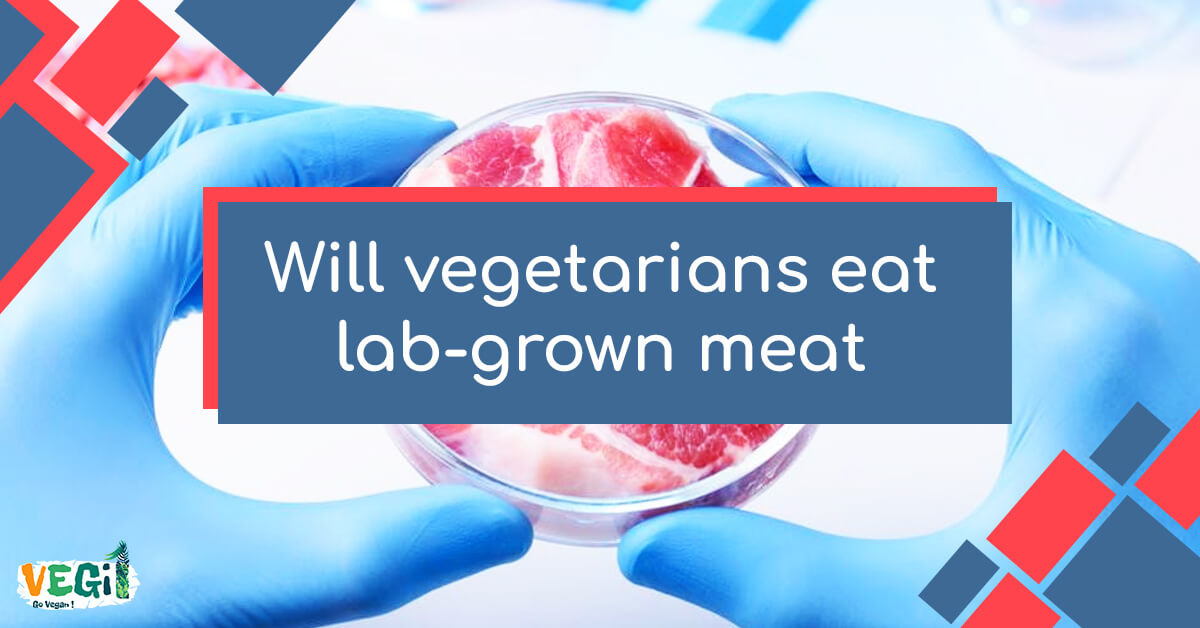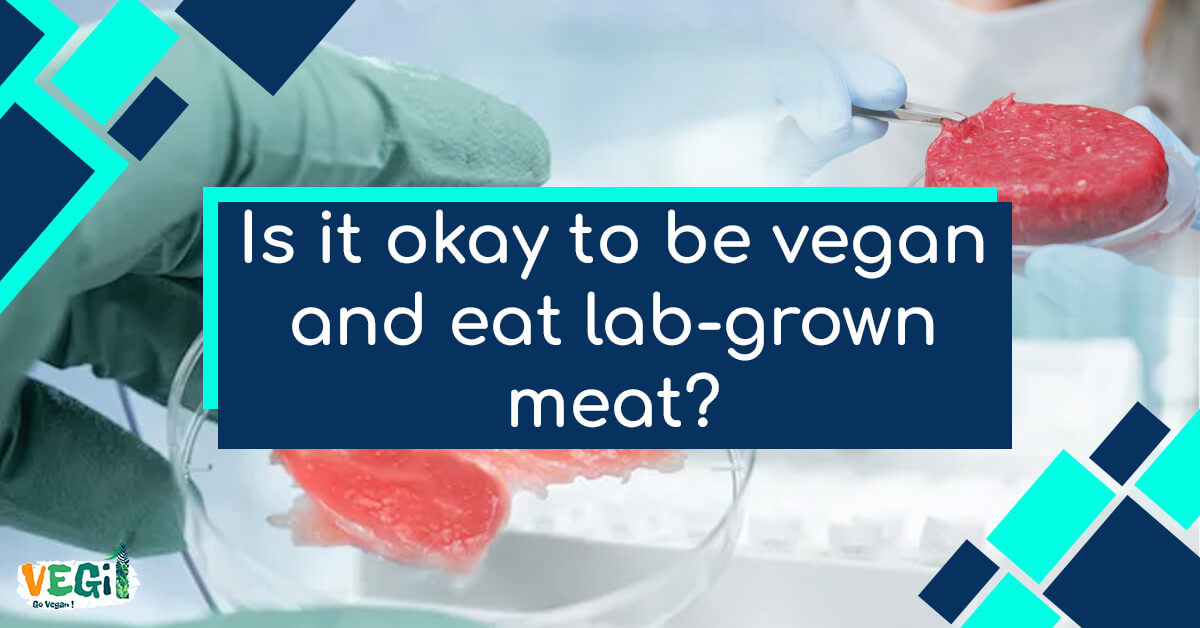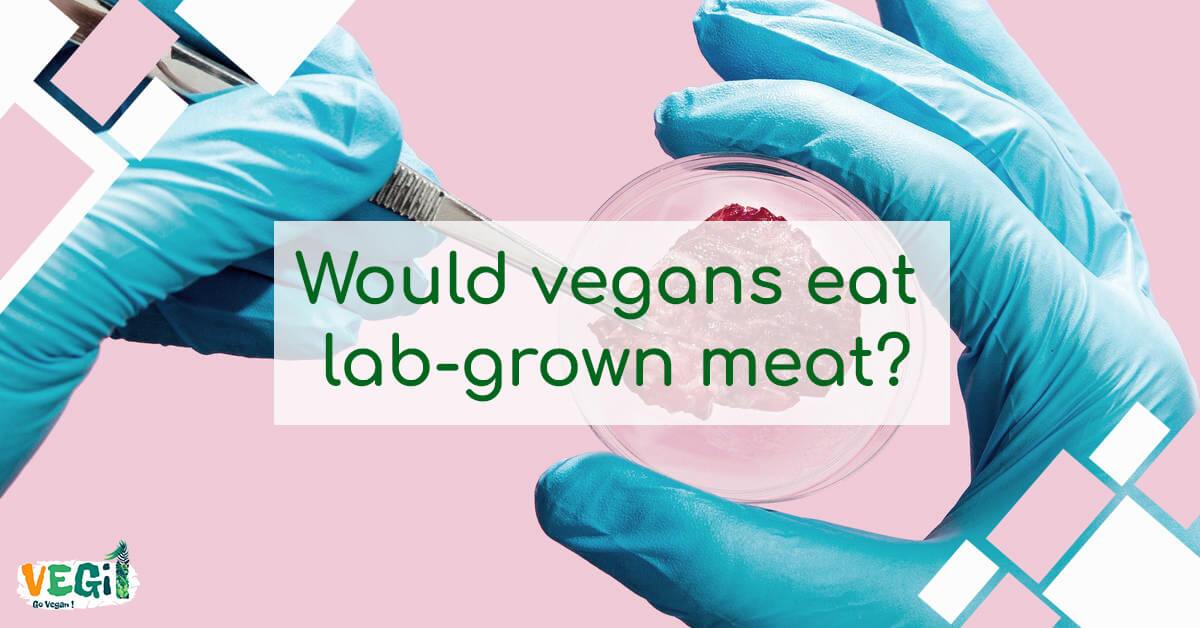Will Vegetarians Eat Lab-Grown Meat?

Hey everyone,
I’m excited to talk to you today about lab-grown meat. It’s a new technology that has the potential to revolutionize the way we eat meat.
Lab-grown meat is created by taking a small sample of animal cells and growing them in a lab. This process doesn’t require any animals to be harmed, so it’s a more humane and sustainable way to produce
meat.
I have been vegan for about 8 years , because I don’t want to contribute to the suffering of animals, and I don’t think it’s right to kill them for food.
But laboratory meats are made from the stem cells of living animals. These cells are grown in the laboratory and are much more healthier than regular meat.
It is true that an animal does not die in this process, but can laboratory meat answer our concerns about animal welfare and environmental effects? Can vegetarians and vegans accept this new technology without compromising their moral principles?
Join me to dive into the technological world of 3D and laboratory meats.

In this article you will read:
What is lab-grown meat
Lab-grown meat, also known as cultured meat or cell-based meat, is created by taking a small sample of animal cells, typically muscle cells, and cultivating them in a lab under controlled conditions. These cells are then nurtured and coaxed to grow into muscle tissue, which can be harvested and processed into various meat products such as burgers, sausages, and even steaks.
The process begins with obtaining a biopsy from a living animal. This method does not require the slaughter or harm of the animal. The cells are then placed in a growth medium. This nutrient-rich solution provides the necessary elements for cell proliferation.
In the lab, the cells multiply and form muscle tissue, mimicking the texture and flavor of conventionally farmed meat. The tissue can be shaped and processed into various meat products using 3D printing technology, offering a customizable and versatile approach to meat production. The result is meat that is nearly identical to traditional animal-derived meat but without the need for raising and slaughtering animals.
Traditional growth mediums have relied on animal-derived ingredients, such as fetal bovine serum (FBS), which raises ethical concerns for us vegans. However, the good news is researchers are actively exploring plant-based alternatives and fermentation cultures to eliminate the need for animal products in the production process.

Will Vegans Embrace Lab-Grown Meat?
I’m a vegan who chose a plant-based diet for ethical, environmental, and health reasons, and I’m interested in exploring whether it could be a viable option for vegetarians and vegans.
Personally, I think it’s important to be open-minded about new technologies, but we also need to be critical and ask tough questions. I’m not sure if lab-grown meat is the answer to the problems of animal agriculture, but I’m willing to keep an open mind and see where it goes.
I’m committed to living a cruelty-free lifestyle and concerned about the environmental impact of meat production. Lab-grown meat could address both of these concerns.
The environmental impact of lab-grown meat
Lab-grown meat can have a significantly lower environmental impact than traditional meat production. This is because it requires less land, water, and energy to produce.
A study by the University of Oxford found that lab-grown beef could have a 96% lower environmental impact than conventional beef production. The study also found that lab-grown chicken could have a 78% lower environmental impact than conventional chicken production.
Animal farming is a major contributor to greenhouse gas emissions, deforestation, and water pollution. Lab-grown meat could eliminate the need for factory farming, which would be a huge win for the environment.
I think lab-grown meat is a great option for people who want to eat meat without harming the environment.
By producing meat directly from cells in a lab, lab-grown meat has the potential to reduce the environmental footprint associated with conventional meat production.
Lab-grown meat could help to reduce the number of animals raised for food, and it could also help to reduce our impact on the environment.
Lab-grown meat: A potential win for animals
In addition to the environmental benefits, lab-grown meat could save billions of animal lives.
The livestock industry is responsible for slaughtering billions of animals yearly, and lab-grown meat could provide a cruelty-free alternative for meat-eaters who are reluctant to give up the taste and texture of animal-derived meat. Lab-grown meat could be a great way to satisfy their cravings without harming animals.
With the mass production of 3D meat and the advancement of this technology, the need for factory farming will decrease, and this can reduce the suffering of many animals who are often kept in cramped and unsanitary conditions.
I know that lab-grown meat is still in its early stages, but I’m optimistic about its future. Because it has the potential to make a real difference for animals and the environment. 3D meat could reduce our reliance on animals for food.
The Health Benefits of Lab-Grown Meat
Lab-grown meat is often considered healthier than conventionally produced meat raised on animal farms.
Here are some of the health benefits of lab-grown meat:
-
Lower in saturated fat and cholesterol
Conventional meat is often high in saturated fat and cholesterol, which can increase the risk of heart disease and stroke. Lab-grown meat is Lower in saturated fat and cholesterol than Animal meat.
-
No risk of bacterial contamination
Animal meat is often produced in crowded, unsanitary conditions. This can lead to the spread of bacteria, such as Salmonella. Also, it can be contaminated with bacteria, such as E. coli, which can cause food poisoning. Lab-grown meat is grown in a sterile environment, so there is no risk of contamination.
-
Free of hormones and antibiotics
Conventional meat is often given hormones and antibiotics to promote growth and prevent disease. These substances can have negative health effects in humans. Lab-grown meat is free of hormones and antibiotics.
Can be customized to be healthier: lab meats can be customized to be lower in fat or more nutritious. This makes it a more versatile option for people trying to eat healthier.
Overall, lab meat production technology is very new and has the potential to be healthier than conventional meats. However, more research needs to be done on its health benefits.
The cost of lab-grown meat
The cost of lab-grown meat is still high, but it is expected to come down as the technology develops. In 2019, Memphis Meats sold its first lab-grown chicken nuggets for $11,000. However, the company has said that it expects to be able to produce lab-grown chicken nuggets for $10 per pound by 2022.
I know some people are hesitant to try lab-grown meat because it’s not yet widely available or affordable. But I think it’s worth being open-minded about this new technology. Lab-grown meat has the potential to make a real difference for the planet and for animals.

Are there any ethical concerns about lab-grown meat?
I’ve been thinking a lot about the ethics and sustainability of eating meat lately. Lab-grown meat is really intriguing to me because it has the potential to address a lot of the concerns that led me to adopt a plant-based diet.
On the one hand, I’m excited about the potential of lab-grown meat to reduce animal suffering and environmental impact. Traditional meat production is a major contributor to climate change, water pollution, and deforestation. Lab-grown meat could help to reduce all of these problems.
For example, a study by the University of Oxford found that lab-grown beef could produce 96% fewer greenhouse gas emissions and use 99% less land than conventional beef production.
On the other hand, I’m also concerned about using animal cells in the production process right now; most lab-grown meat is grown in a medium containing fetal bovine serum, which is a blood product from a slaughtered calf. Some companies are working to develop plant-based growth media, but it’s not clear when this will become widespread.
Also, Even though no animals are killed in the production of lab-grown meat, I believe using animal cells is still unethical. Even if they are not killed, animal abuse is wrong.
For example, The process of harvesting stem cells from animals can be painful and stressful for the animals.
Another concern is the potential for animal exploitation in the research and development of lab-grown meat. Some companies have used animals in taste tests to assess the quality of their products. I think it’s important to avoid this kind of animal testing and to focus on developing lab-grown meat that is delicious and appealing to people without the need for animal testing. However, 3D meat producers should be aware of and try to address these aforementioned ethical concerns of vegetarians.
Vegans, Are You Ready for Lab-Grown Meat?
I’m really excited about the potential of lab-grown meat to make meat production more sustainable and healthier. vegans always looking for ways to reduce their impact on the planet and improve their health, and lab-grown meat seems like a promising option.
I know it’s not perfect yet, but it has the potential to be much more sustainable and healthy than animal meat.
If you’re a vegetarian curious about lab-grown meat, I encourage you to research and learn more about it. I think you’ll be surprised at how promising this technology is.
I also want to add that experimental meats are a great option for some vegetarians who are at the beginning of their journey. If you’re craving a certain type of meat, you can try an experimental meat. This can help you make the transition to a vegetarian diet more smoothly.
And finally, I want to say that I believe veganism is a lifestyle that aims to minimize cruelty. When the urge to eat animal meat comes to you, remember that the cruelty of lab-grown meat is much less than the cruelty of animal meat.
Lab-Grown Meat: The Future of Vegetarian Food?
This new technology could help reduce animal suffering and environmental impact, but is it vegan?
Vegans and vegetarians are always looking for ways to reduce their impact on the environment and animals. Lab-grown meat is an exciting new technology that has the potential to do both. It doesn’t require raising and slaughtering animals, so it could help reduce greenhouse gas emissions and animal suffering.
The Pros and Cons of Lab-Grown Meat for Vegetarians
There are several arguments for and against lab-grown meat:
Pros:
- Reduces animal suffering: Lab-grown meat does not require the raising and slaughtering of animals; this technology could reduce the number of animal farms in the future. It will be a win for everyone.
- More sustainable than traditional meat production: Traditional meat production is a major contributor to climate change, water pollution, and land degradation. Lab-grown meat could help reduce our reliance on factory farming, a major contributor to climate change.
- Can help solve the food shortage problem: As the global population continues to grow, the demand for meat is also increasing. Lab-grown meat could help reduce world hunger by providing a more sustainable source of protein.
Cons:
This new technology could revolutionize the way we eat, but there are still some challenges to overcome.
- It is not technically vegan: Lab-grown meat is made from animal cells and is not technically vegan. Vegans are opposed to consuming any product that comes from an animal, even if the animal is not harmed in the process. Lab-grown meat could be made from plant sources instead of animal cells. This would make it even more appealing to vegetarians and vegans.
- It is still expensive: The cost of producing lab-grown meat is still high, so it is not yet a viable option for many people. This will likely change as technology develops, but it is a luxury item for now.
- It is not clear how sustainable it is: The environmental impact of lab-grown meat is still being debated. Some experts believe that it could be a more sustainable way to produce meat, while others argue that it could have its own environmental drawbacks.
- It’s not clear how healthy it is: Lab-grown meat is still in its early stages of development, so there’s not a lot of data on its long-term health effects. Some vegans may be hesitant to eat it until more is known about its safety.
- It could make it harder for people to go vegan: If lab-grown meat is cheap and widely available, it could make it easier for people to continue eating meat without considering the ethical or environmental implications. This could make it more difficult for vegans to convince others to adopt a plant-based diet.
- The sight of meat can trigger disgust in some vegans: For some vegans, seeing something that looks like animal meat is disgusting and nauseating, and it blinds their appetite, even if no animal by-products were actually used in its production. This is because vegans have a strong emotional connection to animals and see them as friends, not food. So, seeing something that looks like animal flesh can be triggering for them and remind them of the suffering that animals go through in the meat industry.

Conclusion: Is lab-grown meat vegan?
The short answer is that it depends on who you ask. Some vegans believe that lab-grown meat is vegan because it doesn’t involve the slaughter of animals. Others believe it’s not vegan because it’s still made from animal cells.
The official stance of most vegan and vegetarian associations and organizations is that lab-grown meat is not vegan.
For example, the Vegan Society, a leading vegan organization, says that “lab-grown meat is not vegan because it is produced using animal cells.”
However, there is a growing movement of vegans who are open to the idea of lab-grown meat. They argue that it could be a more ethical and sustainable way to produce meat.
Do you want my opinion?
No thanks, I think it’s an important technology to keep an eye on, and I’m excited to see how it develops. But I also want to make sure that I’m making the best decision for myself and for the environment.
As long as I have green peas, beans, lentils, tofu, tempeh, and seeds available to supply the body with protein, I don’t see the need to imprison an animal in a laboratory environment to produce 3D meat similar to the meat of a slaughtered animal. It is true that fewer animals are tortured in 3D meat production. However, we still cannot ignore the suffering of animals whose body cells are used to produce laboratory meat.
But for people who want to switch to this diet and sometimes feel like breaking the rules, they can satisfy their cravings with vegetarian meats or laboratory meats.
I’m curious to hear what other vegetarians and vegans think about lab-grown meat. Would you be willing to try it? Why or why not?
What do you think? Would you be willing to eat lab-grown meat?










